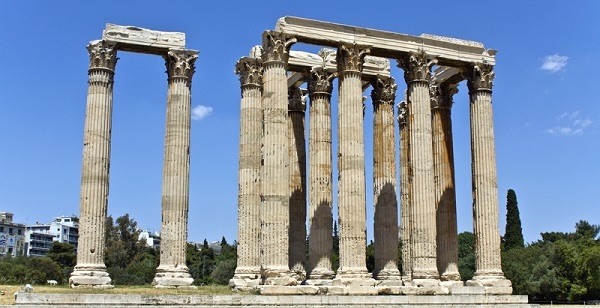

The name Athens, which honors the goddess Athena, is derived from an older Pre-Greek language that dates to between 7,000 and 5,000 B.C.E. It is thought to be the start of Western civilisation.

During the city's Golden Age, notable authors, thinkers, and artists like Hippocrates and Plato flourished. It is the setting for the origins of the concepts of democracy and the constitution as a form of government.
Athens was the biggest and most potent of the Greek city-states. It was given the name Athena, after the goddess of learning and battle.
Athens was a hub for philosophy, scholarship, and the arts during the classical era. It was also the birthplace of many notable philosophers, playwrights, and politicians of the time, including Socrates, and Plato. It is also the birthplace of Democracy.
Because of the importance of its political and cultural accomplishments during the 5th century BCE, it is frequently considered the cradle of Western Civilization.
Athens, the capital of Greece, and its recognisable Acropolis have come to represent the entire nation in the minds of the general public. A more advanced civilization may have emerged as early as 7000 BCE, according to Neolithic evidence of humans living on the Acropolis and adjacent to the agora.
Each clan built a town, known as a polis, where the populace might live without fear of being attacked. Agriculture and grazing were practised in the region surrounding the polis along with sea trade.According to tradition, the creation of Athens was caused by the emperor Theseus uniting several Attican villages into a single state.
Kodros, the last monarch of ancient Athens, sacrificed his life to protect his country. Because they spoke Ionian Greek instead of Doric and upheld customs they believed to be more sophisticated and superior to those of their neighbours, the Athenians asserted a unique place for themselves.
Before becoming the city's senior magistrate at the beginning of the sixth century BC, Solon was one of the wise men who dominated Athenian politics for many years. He is well known, particularly for his initiatives to pass legislation to halt Archaic Athens' moral, political, and economic deterioration. Additionally well-known for his reforms, he is credited with creating democracy in Athens.
Solon put in a lot of effort to ensure that Athens' policies were both just and beneficial as earlier laws were quite severe. He imposed taxes on both brothels and individual prostitutes, legalizing prostitution in classical Athens.
Up until the end of the fifth century, his code served as the cornerstone of Athenian statute law; parts of it were afterwards incorporated into a new codification.
In Classical Athens, two lovers named Harmodius and Aristogeiton (both of whom passed away in 514 BC) were known as the Tyrannicides due to the murder of Hipparchus, the tyrant Hippias' brother.
Hippias was forced into exile a few years later, in 510 B.C.E., by the Spartan monarch Cleomenes I, who also made room for ‘Cleisthenes' later democratic reforms.
To downplay Sparta's contribution to the overthrow of Athenian tyranny, the Athenian democrats afterwards exalted Harmodius and Aristogeiton as national heroes.
Especially notable are the Tyrannicides statues that Cleisthenes ordered.
Cleisthenes established a new type of government that is now known as democracy and that's why he is known as the father of democracy. Although the features of democracy are different from democracy as it is understood today, it provides stability and enables Athens to become the intellectual and cultural epicentre of the classical world which even persists in the contemporary era.
"Golden Age of Athens (5th century BCE)" refers to the time in history when the greatest pieces of philosophy, literature, art, and architecture were created. Under Pericles, the golden age reached its zenith.
From 484 until 423 BCE, Herodotus, the "father of history," resided and conducted business in Athens. Socrates, known as the "father of philosophy," gave lectures in public from 470 to 399 BCE.
The "father of medicine," Hippocrates (460–370 BCE), had a practice there.
Phidias (480–430 BCE) produced some of the finest Greek sculptures ever produced for the Statue of Zeus at Olympia and the Parthenon on the Acropolis, two of the Seven Wonders of the Ancient World.
Also work of Democritus (atomic universe), Plato and Aristotle(philosophers) rose during this period.
Math and science that we read today have origins from the golden age of Athens like Pythagoras' theorem, geometry, etc.
Due to the Peloponnesian war, the golden age of Athens came to an end and it merged into the Spartan empire.

Temple of the Olympian Zeus at Athens
Only the city's status as a premier centre of learning, Greek philosophy, and culture spared the city from being sacked and its residents from being sold into slavery as a result of the war.
The city's wealth, the empire, and the city's fortifications had all been destroyed. Athens rose to prominence as a major religious hub after the Roman Empire embraced Christianity.
Pagan schools were shut down and temples were either demolished or turned into churches in the sixth century CE. Later on, under Ottoman rule, the city finally declined.
Athens once more saw a renaissance following Greece's 1821 victory over the Turks.
The new administration made preservation and restoration efforts a top priority, and the city eventually regained some of its former beauty.
While the word Athens still conjures up images of the classical world and the heights of literary and intellectual success, the Parthenon on the Acropolis continues to stand in for the greatest of ancient Greece's ideals.
Q1. Write a short note on the Ancient Athenian Economy?
Ans. The basis of the Athens economy was trade. They are not self-sufficient in terms of food grains. Athens had a fantastic harbour and was close to the ocean. To get the goods and resources they required, Athenians traded with other city-states and some other nations.
Q2. How did Athens come under Macedonian rule?
Ans. At the Battle of Chaeronea in 338 BC, Macedonia cemented its hold over Athens by thwarting a Greek coalition force led by Athens and Thebes.
Q3. Why did the Delian League was formed by Pericles?
Ans. A coalition of Greek city-states led by Athens founded the Delian League, also known as the Athenian League, in 478 B.C. with the stated goal of defending against Persian Empire retaliation attacks. The league also increased Athens' power and reputation.